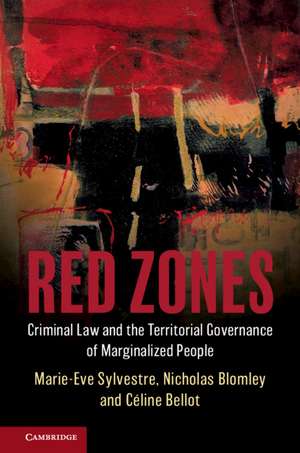Red Zones: Criminal Law and the Territorial Governance of Marginalized People
Autor Marie-Eve Sylvestre, Nicholas Blomley, Céline Belloten Limba Engleză Paperback – 2020
| Toate formatele și edițiile | Preț | Express |
|---|---|---|
| Paperback (1) | 207.35 lei 3-5 săpt. | |
| Cambridge University Press – 2020 | 207.35 lei 3-5 săpt. | |
| Hardback (1) | 698.61 lei 3-5 săpt. | |
| Cambridge University Press – 2020 | 698.61 lei 3-5 săpt. |
Preț: 207.35 lei
Nou
Puncte Express: 311
Preț estimativ în valută:
39.69€ • 41.28$ • 33.26£
39.69€ • 41.28$ • 33.26£
Carte disponibilă
Livrare economică 20 februarie-06 martie
Preluare comenzi: 021 569.72.76
Specificații
ISBN-13: 9781316635414
ISBN-10: 1316635414
Pagini: 188
Ilustrații: 14 b/w illus. 8 maps 28 tables
Dimensiuni: 153 x 228 x 14 mm
Greutate: 0.45 kg
Editura: Cambridge University Press
Colecția Cambridge University Press
Locul publicării:New York, United States
ISBN-10: 1316635414
Pagini: 188
Ilustrații: 14 b/w illus. 8 maps 28 tables
Dimensiuni: 153 x 228 x 14 mm
Greutate: 0.45 kg
Editura: Cambridge University Press
Colecția Cambridge University Press
Locul publicării:New York, United States
Cuprins
List of figures; List of maps; List of tables; Acknowledgments; Table of cases; Table of legislation; 1. Navigating the territories of the law; Part I. Foundations: 2. Law and territory, a legal geography; 3. 'Recognizances to keep the peace and be of good behaviour': the legal history of red zones and conditions of release; Part II. Expansion: 4. Territory widening; 5. The shifting and expanding terrain of criminal justice management; Part III. Territorialization and its Consequences: 6. Territorializing: how legal territory is made and justified; 7. Conditional life inside the red zone; 8. Red zoning politics; Conclusion; 9. Red zones in and out of the courtroom; Bibliography; Index.
Recenzii
'A brilliant contribution to criminal law and criminal law theory! In their remarkable empirical and legal study on Red Zones, Marie-Eve Sylvestre and her colleagues, Nicholas Blomley and Céline Bellot, show how the quotidian forms of law's technical practices - such as bail and probation supervision - have a momentous impact on the administration of the criminal law, on punishment practices, and on our own understandings and expectations of justice. Chock full of insights about how these practices function to regulate the poor and create both spatial and temporal effects that make rights arguments and resistance far more difficult, Red Zones is a must read for anyone studying criminal law, criminal law theory, and policing.' Bernard E. Harcourt, Isidor and Seville Sulzbacher Professor of Law, Columbia University
'A huge contribution to criminology and to urban geography, this book shows, with vast amounts of data, that low-level judicial proceedings such as bail act in a dysfunctional manner by imposing unrealistic spatial prohibitions on those who most need to access services and friends in stigmatized downtown areas. The far-ranging empirical research, carried out mainly in Vancouver and Montreal, is of great relevance not only across Canada but throughout North America, since the practice of imposing 'red zones' (spatial prohibitions) through probation, parole and other lower-court and police mechanisms has become ubiquitous.' Mariana Valverde, University of Toronto
'Red Zones is a highly original and ground-breaking book that compellingly reveals how marginalized peoples are increasingly governed through territory and time via criminal law and justice processes. Its rare combination of legal theory and rich empirical data will appeal to legal scholars, criminologists and geographers alike.' Randy K. Lippert, University of Windsor
'A huge contribution to criminology and to urban geography, this book shows, with vast amounts of data, that low-level judicial proceedings such as bail act in a dysfunctional manner by imposing unrealistic spatial prohibitions on those who most need to access services and friends in stigmatized downtown areas. The far-ranging empirical research, carried out mainly in Vancouver and Montreal, is of great relevance not only across Canada but throughout North America, since the practice of imposing 'red zones' (spatial prohibitions) through probation, parole and other lower-court and police mechanisms has become ubiquitous.' Mariana Valverde, University of Toronto
'Red Zones is a highly original and ground-breaking book that compellingly reveals how marginalized peoples are increasingly governed through territory and time via criminal law and justice processes. Its rare combination of legal theory and rich empirical data will appeal to legal scholars, criminologists and geographers alike.' Randy K. Lippert, University of Windsor
Notă biografică
Descriere
Examines the court-imposed territorial restrictions and other bail and sentencing conditions that are increasingly issued in the context of criminal proceedings.
